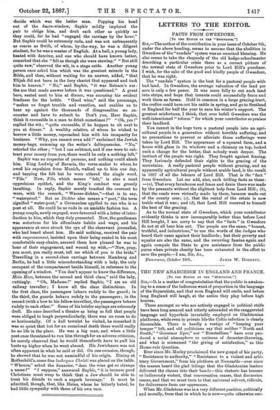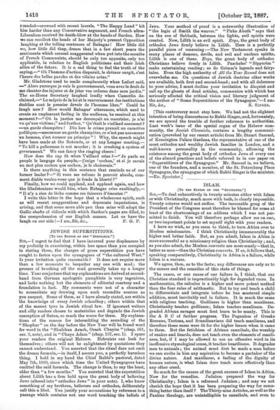THE NEW ANARCHISM IN ENGLAND AND FRANCE. [To THY EDITOR
OP THE"SPECTATOR."]
Sia,—It is a matter of congratulation that the public is awaken- ing to a sense of the ludicrous want of proportion in the language of the Separatists, and that soon England will smile, and before long England will laugh, at the antics they play before high heaven.
Those amongst us who are actively engaged in political strife have been long amazed and utterly astounded at the exaggerated language and hyperbole invariably employed on Gladetonian platforms, while even in private life the Celtic infection is clearly discernible. There is hardly a vestige of "keeping your temper " left, and old politicians say that neither " North and South," " Governor Eyre," nor " Bimetallism " have ever pro- duced a social atmosphere so ominous of decanter-throwing, and what is misnamed "the giving of satisfaction," as this Home-rule Question.
Ever since Mr. Morley proclaimed the new gospel of his party, "Resistance to authority," "Resistance to a violent and arbi- trary Government," from his platform at Newcastle—ever since the masses heard the glad tidings that the Gladstonian leaders delivered the classes into their hands—this rhetoric has become so ludicrously violent, that conversation ceases, that discussion ceases, and that we must turn to that universal solvent, ridicule, for deliverance from our oppressors.
When Mr. Gladstone was in a very different position, politically and morally, from that in which he is now—quite otherwise stir- raunded—crowned with recent laurels, "The Happy Land " hit him harder than any Conservative argument, and French ultra- Liberalism received its death-blow at the hands of Sardon. How we can recollect the heads of her Majesty's present Opposition laughing at the telling sentences of Rabagas ! How little did we, how little did they, dream that in a few short years the sentiments which seemed exaggerated when put into the months of French Communists, should be only too apposite, only too applicable, in relation to English politicians and their Irish allies of the future. It is a sad thing to feel the truth of the saying,—" Ou rhomme d'action disparait, le rheteur surgit, c'est l'henre des belles paroles et des vilains actes."
Mr. Gladstone used to -smile complacently when Lafort said, • —" Alors parceque je snis le gonvernement, vons avez is droit de me chanter des injures et de jeter vos ordures dans mon jardin." The ex-Home Secretary laughed loudly when Camerlin de- claimed,—" Le niS psis de la loi et le renversement des institutions Stabiles sent Is premier devoir de rhomme libre." Could he laugh now ? How would Rabagas' utterances, which used to create an unpleasant feeling in the audience, be received at this moment?—" On la justice me denongait an meurtrier, je n'ai vu qu'une victims ;" and further, " Qu'etait le vieillard assomme ? --un garde chatnpetre ! Des loss le crime prenait nn caractere politique,—assommer no garde champetre, ce n'est pee assommer on homme, c'est ecraser un principe " ! Why, the speech might have been made at the Rotunda, or at any League meeting,— " To kill a policeman is not murder ; it is crushing a system of government." We can fancy the ringing cheers !
How does the cap fit when Vuillard cries ?—" Je parle an people le langage du penple,—j'exige cochon,' et si je savais on mot plus cochon que cochon, je le ohoiserais."
Is there anything in this sentence that reminds us of our former leader ?—" Si vons me refuses le ponvoir absolu, com- ment diable vonlez-vons qua je fonde la liberte ?"
Finally, how we could applaud, and applaud again, and how the Gladstonians would hiss, when Rabagas cries exultingly,— " II n'y a rien de liiche comme ces faiseura d'dmeotes !"
I write this letter in the hope that a wholesome spirit, such as will resent exaggerations and deprecate imputations, is arising, and that some more able pen than mine will adopt the Gallic shafts of ridicule with which Sardou's pages are filled, to the comprehension of our English masses. Let us have the laugh on our side !—I am, Sir, &c., F. G. P.







































 Previous page
Previous page